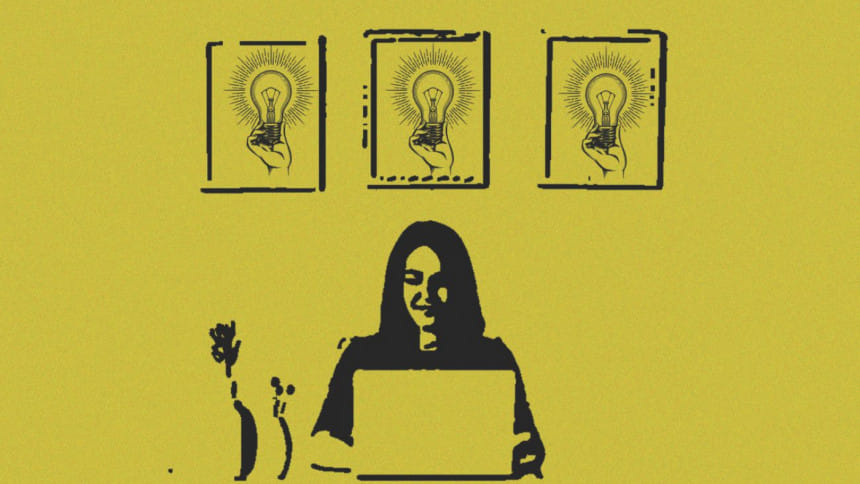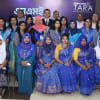Think equal, build smart, innovate for change

Innovations in policies, management, finance, science and technology are increasingly recognised as a way to accelerate the achievement of the SDGs for all. From mobile banking ventures that facilitate women's entrepreneurship to e-learning platforms that take classrooms to individuals, social innovations have the potential to serve as powerful tools to break trends and increase awareness, access and the availability of opportunities. This is particularly true for women experiencing marginalisation due to their age, ethnicity, education, income, disability, location or migratory status.
In Bangladesh,we have inspiring women leaders who are making significant contributions through innovation.
Luna Shamsuddoha is a successful Bangladeshi entrepreneur—the chairperson of a software firm Dohatec New Media which she founded. She is also founder and president of Women in Technology dedicated to mobilising women in all levels of the technology industry. She received the Bangladesh Business Award-2017 for her contribution to the country's economy and has been awarded for her work in local software industry as women entrepreneur.
We also know Bibi Russell who is the founder of Bibi Production, a world-renowned fashion house that has been incorporating traditional textile into designs, and in the process has been reviving weaving and handicrafts in villages and giving a chance to thousands of people to rise out of poverty.
There are also inspiring stories of women in the new and emerging fields and Ivy Huq Russell is one of them. She is a former banker and founder of the Maya app which empowers women through giving them access to information on women's health and anything of relevance to a woman's life.
And there are many more like them who became successful through their innovations.
While there is great excitement around innovation, we should also recognise that there are gender gaps in this field. Globally, one of the main reasons for under-representation of women as innovators and entrepreneurs is their under-representation in Science, Technology and ICT related fields. Data shows in 2014, only 18 percent US based start-ups had at least one female founder, similarly 6 percent app developers are women and based on current trends, women will hold only one in five computing related jobs by 2025 in the US. I imagine that the picture is similar in Bangladesh, and given that an estimated 90 percent of the future jobs globally will be in the ICT sector, there is a lot of catching up to do.
First, digital solutions are probably the most impactful innovations to accelerate progress towards gender equality, and gender equality in innovation calls for removal of barriers faced by women and girls in their engagement in STEM (science, technology, engineering and mathematics) and ICT. In Bangladesh, we have seen tremendous progress in primary level enrolment of girls, and the government's school stipend programme has created positive impacts in raising the level of education among rural girls. However, the gender digital divide is significant. Girls need to be further given the opportunity to study STEM, and gender barriers for them to access technology and innovation-oriented jobs need to be removed.
Second, we need to have more research and studies that consider the needs of women as the basis for innovation. Furthermore, data on women's access and usage of innovation and technology is not widely available. For example, sex-disaggregated data on mobile phone ownership can be especially difficult to track in markets where men commonly register for their wives and daughters. This leads to gender-blind products and services, industry practices and national policies.
Third, we need to make social and public services more accessible for women, so that more of their time is freed up to invest in developing and executing their innovative and entrepreneurial ideas. According to a survey conducted in 2012, women in Bangladesh spend four times more hours than men in domestic and care work in comparison to men. This means that women have far less time for creative thinking and income generating work. Access to quality and affordable child-care facilities, financing and skills development opportunities will also help increase their ability to expand their options.
Finally, we should disrupt “business as usual” and transform negative social norms that are at the root of hindering women and girls to fully access and contribute to innovation. Innovation has the potential to serve as a powerful tool to break trends and increase awareness, access and the availability of opportunities for women and girls, men and boys.
Together we can be game-changers with the women and girls, men and boys of the world, we can make the 21st century one and irreversible progress—for women and all humanity.
Shoko Ishikawa, Country Representative, UN Women Bangladesh

 For all latest news, follow The Daily Star's Google News channel.
For all latest news, follow The Daily Star's Google News channel. 








Comments